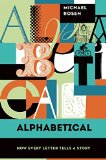Summary | Excerpt | Reviews | Beyond the Book | Readalikes | Genres & Themes | Author Bio

Critics' Opinion:
Readers' Opinion:
First Published:
Feb 2015, 448 pages
Paperback:
Feb 2016, 256 pages
 Book Reviewed by:
Book Reviewed by:
Kate Braithwaite
Buy This Book
Q W E . T Y I U O P
Z S D F G H J K L M
A X & C V B N ? ; R
Remington adjusted this, so that by 1878 it was:
2 3 4 5 6 7 8 9 – '_
Q W E R T Y U I O P :
A :. S D F G H J K L M
& Z C X V B N ? ; . !
Mistakenly, some people have said the qwerty layout enabled people to type faster. In fact, it was designed to slow typists down, requiring them to use different fingers or different hands for letters which were likely to appear together. What's odd is that it's survived. An electronic keyboard won't jam. There are no 'typebars'. Given that most people's quickest fingers are likely to be the index finger of each hand, one way to make typing faster would be to situate high-frequency letters within the orbit of those two fingers and the least frequent in the orbit of the third and fourth fingers.
If you can touch-type, you can expose yourself to a disconcerting experience by trying to touch-type on a keyboard with a slightly different arrangement. In France they use the 'azerty' keyboard which is arranged like this:
A Z E R T Y U I O P
Q S D F G H J K L M
W X C V B N
as opposed to (to remind you):
Q W E R T Y U I O P
A S D F G H J K L
Z X C V B N M
No one knows exactly why France adopted 'azerty' and any efforts to alter it have failed.
As Sholes sold the patent to Remington he made very little money out of his contribution to typewriting and keyboards. He is recorded as saying: 'Whatever I may have felt in the early days of the value of the typewriter, it is obviously a blessing to mankind, and especially to womankind. I am glad I had some- thing to do with it. I built it wiser than I knew, and the world has the benefit of it.' Densmore was more canny. He retained a royalty and died with half a million dollars to his name.
As with most technology, the typewriter and the keyboard can be seen as both emancipating and oppressing at the same time. It enabled millions of women to earn money independently, and to see worlds other than their homes. On the other hand, it put those same women into what used to be called 'the typing pool', where, all day and every day, they pounded typewriters to 'write' what wasn't their own writing on the machines that weren't theirs. I can now see the importance of my mother owning her own typewriter. It enabled her, in the 1940s and 50s, to write what she wanted to write and present it with the same quality as the best around.
The first typewriter I saw belonged to my mother. My mother was Mum, to my father she was 'Con', to friends she was 'Connie', to children and colleagues at her school she was 'Mrs Rosen', but in a disconcerting way, every so often she was a 'typist' and a 'secretary'. She became this because of a locked black box stored in our 'front room' along with a furry square mat. This was her Remington typewriter, which she could sit at for hours, threateningly ignoring the rest of us, typing away without looking at the keys, at a rate of clacketty-clacks matched only by the speed she clacketty-clacked with her knitting. We could see that there was an inaccessible, unreachable part of Mum working away in there that wasn't very Mum at all. It belonged to some earlier pre-Mum era when we didn't even exist.
I liked to sit next to her and watch how her long fingers hammered away, how the metal letters stuck on their thin arms flailed to and fro, how the ribbon jumped up and down, and the ribbon's wheels jigged round. I liked the way things got stuck every so often and she would hesitate for a moment, poke her finger into the jangled arms, release them and carry on.
Excerpted from Alphabetical by Michael Rosen. Copyright © 2015 by Michael Rosen. Excerpted by permission of Counterpoint Press. All rights reserved. No part of this excerpt may be reproduced or reprinted without permission in writing from the publisher.





The House on Biscayne Bay
by Chanel Cleeton
As death stalks a gothic mansion in Miami, the lives of two women intertwine as the past and present collide.

The Flower Sisters
by Michelle Collins Anderson
From the new Fannie Flagg of the Ozarks, a richly-woven story of family, forgiveness, and reinvention.

The Funeral Cryer by Wenyan Lu
Debut novelist Wenyan Lu brings us this witty yet profound story about one woman's midlife reawakening in contemporary rural China.
Your guide toexceptional books
BookBrowse seeks out and recommends the best in contemporary fiction and nonfiction—books that not only engage and entertain but also deepen our understanding of ourselves and the world around us.